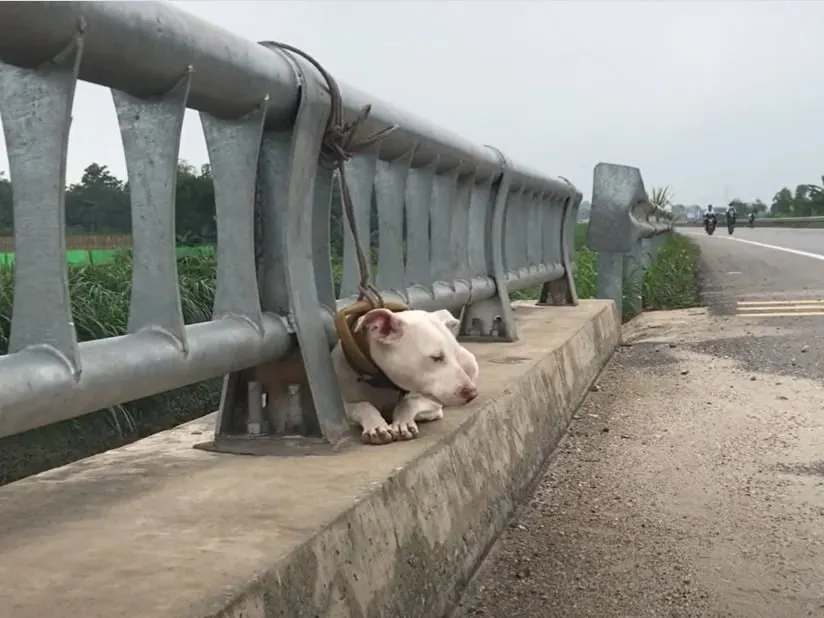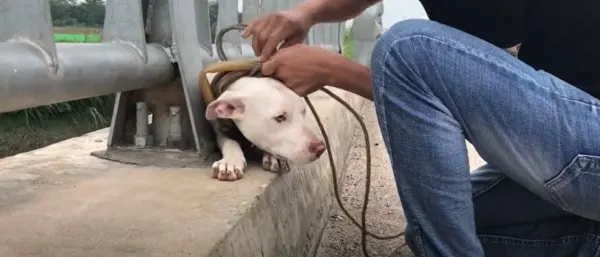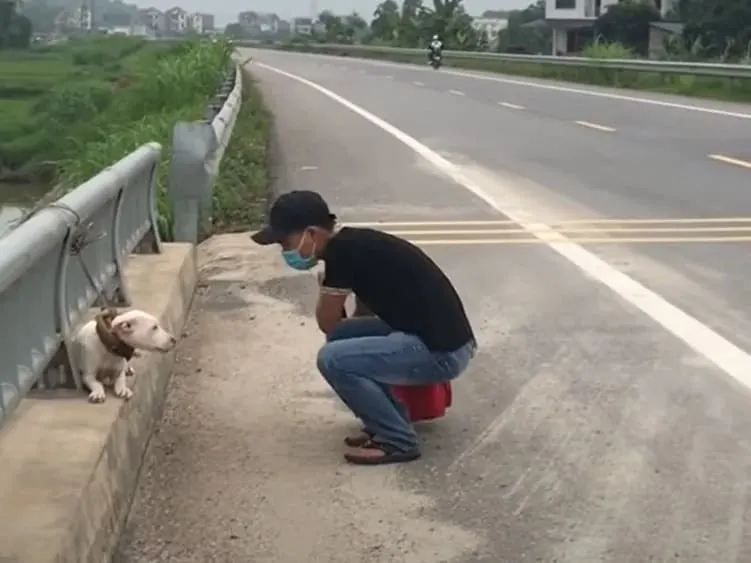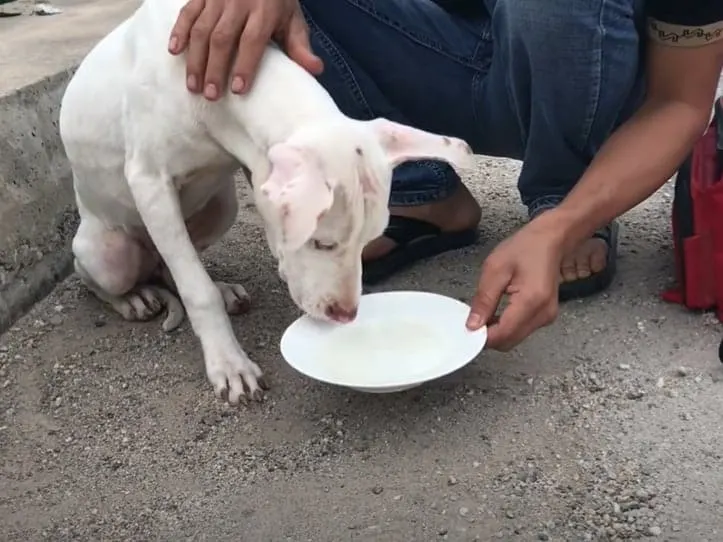The problem of animal abuse is generally misperceived and not dealt with appropriately in most parts of the world. While in nearly fifty states, abandoning a pet is considered as animal abuse and a criminal offense, the abandonment issue is still on the rise, with no adequate response to it.
Take a look at this doggo girl as an example! She was a victim of neglect and animal abuse, left at the mercy of the road and tied to a bridge railing with a tight hose around her neck.
Her previous owners didn’t seem to care if she was hit by a car or starved to death, as she was mercilessly left to fight for her life on her own.
All Alone On A Busy Road

In the middle of who-knows-where, the Pittie girl was sitting on a large bridge, tied to a metal guardrail. She was desperately waiting for someone to help her, and lucky for her, she didn’t have to wait for too long.
A local rescuer received a call about an abandoned dog inhumanely tied to a bridge, and he rushed to the spot shortly after. When he got to the place of abandonment, the doggo girl was frightened, sitting in panic.
She was still in shock of being dumped by her family, completely out of trust for other hoomans. On top of all that, she seemed severely stressed out and anxious, but her good Samaritan was inclined to help her no matter what!
The Most Inhumane Neck Restraint

When he approached her, he saw a leash around her neck tied so uncomfortably to the railing that she wasn’t able to rest her head at all.
On top of all that, the Pittie girl had an extra hose tied around her neck. Being on her own for a little longer, she would’ve definitely been in much worse condition than she was in.
The rescuer spent quite some time trying to get her out, until he finally succeeded. After an eternity of being helpless, the Pittie was finally unleashed and saved from a dangerous road.
Initiating Friendly Contact For The First Time In Who Knows How Long

The rescuer didn’t come empty-handed. He brought some treats, water, and a bowl to feed the dog. This poor girl was evidently scared and she desperately needed a friend, and this giant-hearted man knew how to get things going.
After eating her first bite, he gently petted her on the head, and she reciprocated! She gave him a gentle look and immediately calmed down, as if she knew that from now on, everything would be fine.
She’s Starting To Believe Hoomans Again

She seemed so happy knowing that she was finally off the leash. She practically devoured the whole plate of food and then was treated with a special play time in the grass, which she loved!
Things could’ve ended badly for this girl, but thanks to her hero rescuer, she got a second chance, and she couldn’t be happier!
If you’ve ever woken up to a damp surprise in your bed courtesy of your furry friend, you’re not alone. Dogs have a peculiar habit that can leave you scratching your head in confusion. Picture this: you come home after a long day, looking forward to snuggling up in your cozy bed, only to find it’s been claimed as a spot for a bathroom break. It’s a frustrating situation that many dog owners face at some point.
You love your pup, but the mystery behind why they choose your bed as their personal restroom might leave you bewildered. Understanding the reasons behind this behavior can shed light on your dog’s actions and help you find ways to address it. So, why do dogs have this tendency to turn your bed into a bathroom? Let’s unravel the curious case of why our beloved companions sometimes leave us with soggy surprises.
Understanding the Behavior: Why Do Dogs Pee in Your Bed
Exploring Canine Psychology
Understanding why your dog may pee in your bed can shed light on this behavior. Dogs have a keen sense of smell and use urine to communicate with other animals. When a dog pees on your bed, it could be a way of marking territory or feeling secure in your scent.
Marking Territory vs. Seeking Attention
Dogs are territorial animals and may urinate on your bed to establish their scent in a shared space. This behavior can also be a cry for attention or a sign of anxiety. By determining the underlying reason, you can address the issue effectively.
Health Issues That Can Cause Bed-Wetting
Health problems like urinary tract infections, incontinence, or diabetes can lead to involuntary urination in dogs. If your dog suddenly starts peeing in your bed, it’s essential to rule out any medical conditions by consulting a veterinarian promptly.
Common Triggers for Inappropriate Urination in Dogs
Stress and Anxiety Factors
Stress and anxiety can cause your dog to urinate on your bed. Dogs, like humans, can feel overwhelmed or anxious in certain situations. Loud noises, changes in their environment, or feeling left alone for extended periods can trigger stress in your furry friend, leading to accidents on your bed. It’s important to create a safe and calming environment for your dog to reduce their anxiety levels and minimize the chances of bed-wetting incidents.
Changes in the Household or Routine
Changes in your household or daily routine can also play a role in why your dog pees on your bed. Dogs thrive on consistency and may feel unsettled when there are sudden changes in their living environment or daily schedule. Moving to a new house, welcoming a new family member, or even alterations to feeding times can disrupt your dog’s sense of stability, potentially resulting in accidents on your bed. Keeping your dog’s routine as consistent as possible can help prevent such behavior.
Dominance and Submission Signals
Issues related to dominance and submission within the household hierarchy can influence your dog’s behavior, including inappropriate urination. Dogs may mark their territory, including your bed, to assert dominance or submission to other family members or pets. Understanding and addressing these dynamics through proper training and guidance can help eliminate the need for your dog to mark its territory inappropriately. Establishing clear leadership and boundaries within your home can help mitigate dominance-related urination issues.
Medical Reasons Behind Your Dog’s Bed-Wetting
Urinary Tract Infections (UTIs)
UTIs are a common medical issue that can lead to dogs urinating in inappropriate places like your bed. When your furry friend has a UTI, it can be uncomfortable and may cause accidents indoors. If you notice frequent urination, straining to pee, or blood in the urine, your dog might be dealing with a UTI. Consulting your vet for proper diagnosis and treatment is essential to help your dog feel better and prevent accidents on your bed.
Incontinence in Older Dogs
As dogs age, they can experience incontinence, which is the loss of bladder control. This condition can result in your older dog urinating in your bed unknowingly. Incontinence is more common in senior dogs and can be caused by weakened bladder muscles or underlying health issues. Providing extra bathroom breaks, using doggy diapers, and discussing medication options with your vet can help manage incontinence and reduce accidents on your bed.
Diabetes and Kidney Problems
Diabetes and kidney problems can also contribute to your dog’s bed-wetting behavior. Dogs with diabetes may drink and urinate more frequently, leading to accidents indoors. Kidney issues can result in increased urination and accidents as well. Monitoring your dog’s water intake, observing any changes in bathroom habits, and seeking veterinary care for proper diagnosis and management of these conditions can help prevent bed-wetting episodes related to diabetes and kidney problems.
Training Tips to Prevent Your Dog from Peeing in the Bed
Establishing a Bathroom Routine
To prevent your dog from peeing in your bed, establish a consistent bathroom routine. Take your dog out for potty breaks at regular intervals throughout the day, especially after meals and playtime. By creating a predictable schedule, you help your dog understand when and where to relieve themselves, reducing the chances of accidents on your bed.
Positive Reinforcement and Consistency
Use positive reinforcement techniques to encourage proper bathroom behavior. Praise and reward your dog with treats or verbal affirmations when they urinate in the designated outdoor spot instead of indoors. Consistency is key; ensure that everyone in the household follows the same training methods to avoid confusing your dog. By reinforcing good habits, you can effectively train your dog to avoid peeing on the bed.
When to Seek Professional Help
If despite your efforts, your dog continues to pee on the bed, it may be time to seek professional help. Consult a veterinarian to rule out any underlying medical issues such as urinary tract infections, diabetes, or kidney problems. These health conditions can contribute to inappropriate urination behavior and require proper diagnosis and treatment. Seeking professional guidance can help address any medical reasons behind your dog’s bed-wetting behavior effectively.
Cleaning and Prevention Strategies
When accidents happen, and your furry friend decides to mark their territory on your bed, here are some cleaning and prevention strategies to help you manage the situation effectively.
Removing Odors Effectively
To tackle those stubborn odors left behind by your dog’s mishap, you’ll need more than just a basic clean. Here’s how you can effectively eliminate the smell:
- Enzymatic Cleaners: Invest in enzymatic cleaners specifically designed to break down and remove the odor-causing components of your dog’s urine effectively.
- Baking Soda: Sprinkle some baking soda on the affected area, let it sit for a few hours, then vacuum it up to absorb lingering odors.
- Vinegar Solution: A mixture of vinegar and water can help neutralize odors. Simply spray it on the area, let it sit for a while, then blot it dry.
Protecting Your Bedding
Prevention is key to keeping your bed pristine and free from any future accidents. Here’s how you can protect your bedding from unwanted incidents:
- Waterproof Mattress Covers: Consider using waterproof mattress covers to shield your bed from any accidents while still maintaining comfort.
- Dog-proofing: Limit your dog’s access to your bedroom when unsupervised to reduce the likelihood of accidents occurring on your bed.
- Creating a Comfortable Space: Provide your dog with a cozy, designated sleeping area that’s separate from your bed to discourage them from urinating on it.
Monitoring Your Dog’s Behavior
Keeping an eye on your dog’s behavior can give you valuable insights into their needs and habits. Here’s what you should pay attention to:
- Changes in Behavior: Watch out for any sudden changes in your dog’s urination habits or behavior that could indicate underlying issues.
- Regular Bathroom Breaks: Establish a consistent bathroom routine for your dog to minimize the chances of accidents happening inside the house.
- Professional Help: If your dog continues to urinate on your bed despite your best efforts, consult with a veterinarian to rule out any medical conditions that may be causing this behavior.
Remember, with a bit of patience, consistency, and the right strategies in place, you can effectively manage and prevent your dog from peeing on your bed.
Conclusion
Understanding why your dog might pee on your bed is key to addressing this behavior effectively. From scent marking to health issues like UTIs, there are various reasons behind this behavior. Managing accidents involves using the right cleaning products and preventive measures like waterproof covers. By monitoring your dog’s behavior, establishing routines, and seeking professional advice when needed, you can create a comfortable and stress-free environment for your furry friend. Remember, patience and consistency are key in handling this issue. With the right approach, you can minimize accidents and ensure a harmonious coexistence with your beloved pet.
Frequently Asked Questions
Why do dogs urinate on beds?
Dogs may urinate on beds due to scent marking, seeking comfort, stress, routine changes, or dominance/submission dynamics.
What are common triggers for dogs urinating on beds?
Common triggers include UTIs, incontinence, diabetes, and kidney issues, which may manifest through symptoms like frequent urination or accidents.
How can I manage and prevent dogs from urinating on beds?
Manage accidents effectively by using enzymatic cleaners, baking soda, and vinegar solutions to remove odors. Protect bedding with waterproof covers, dog-proof the bedroom, and create a comfortable sleeping space for the dog. Monitor behavior, establish a bathroom routine, and seek professional help if needed.
[no_toc]

Hey there, I’m Janet Brooks, a dog-loving student from California. I’m all about helping pups in need, especially those without homes. Me and my awesome friends work together to give shelter and love to stray dogs. Oh, and I also write blogs about dogs to share helpful info.